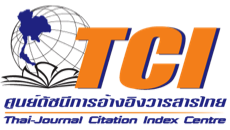Modes of Production and Food Security in Cultural Dimensions Ban Thiphuye, Thailand
Keywords:
Mode of Production, Food Security, EthnicityAbstract
The purpose of this area study was to investigate modes of production and food security in cultural dimensions on local resources diversity, a case study of the Pwo Karen Community of Ban Thiphuye, Chalae Sub-district, Thong Phaphum District, Kanchanaburi Province. This qualitative research employed applied anthropological research method. Data were gathered from related literature, and field data were gathered through semi-structured in-depth interviews, and participant and non-participant observations. The data were validated at every step. The study found that “Thiphuye” is a Karen word meaning a small creek with a lot of “Ye” trees, a tree similar to Tao Rang, a kind of palm tree, along the banks. The majority of the population of this community is Pwo Karen whose main occupation is agriculture. In the past their modes of production was subsistence agriculture and production for sale. Factors influencing the changes were (1) state development, and (2) capitalist market mechanisms. These factors resulted in changes in the economic system of the community. Nevertheless, people’s roles in their families were still based on their traditional culture where everyone in the family participates in the activities, particularly, the activities of subsistence agriculture. This provides them with food security that corresponds with the concept of sustainable agriculture or alternative agriculture that has long been inherited in the community that provides them with flexibility that enables them to adapt to the changing situation. This is the answer to why this community can maintain the sustainable way of life on local resources diversity.
Downloads












.png)


